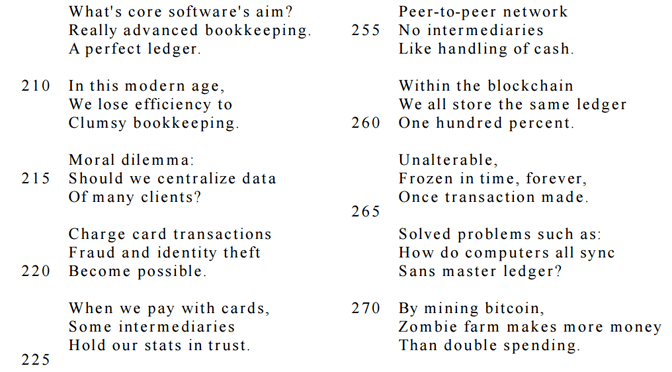Ich liebe dieses Projekt von Trevor Salyzyn (pdf / auf Github), in dem er in 150 Haikus Ökonomie, Technologie und Philosophie lyrisch miteinander verknüpft und damit ganz nebenbei auch die Grundlagen von Bitcoin und der Blockchain erklärt.
150 Haikus zu Bitcoin und der Blockchain
Für Geisteswissenschaftler wie mich zwischen all den technisch-abstrakten Whitepaper eine sehr willkommene Abwechslung. Hier eine Auswahl meiner Favoriten.
How can we apply
The lessons of Internet
To our capital?A transcendental,
Meta-economic thought:
„What is currency?“Permanent times stamps:
To maintain security.
Maintain the blockchain.Deep security.
A blockchain is more hack-proof
Than a government.Own your own data
Get paid if it’s valuable
End of Big Data.Paypal stopped service
For WikiLeaks donations.
Spotlight on bitcoins.Only consensus
Keeps the process running well.
No reward for cheats.Open source software:
One can freely alter it
And look at the code.The longest blockchain
Is automatically
The official one.When trying to mine,
Trial-and-error solution.
Millions of attempts.Two-of-three wallet
Requires two sigs to open.
Can be further scaled.Is bitcoin a threat?
How will governments respond
To mathenomics?
Wenn das Problem zu abstrakt ist, kann Lyrik helfen
Am meisten begeistern mich aber die Dreizeiler über das Problem der Byzantinischen Generäle, dem Kernproblem, dessen Lösung die Blockchain so innovativ macht. Ganz ehrlich – diese Haikus erklären das sogar besser als der Wikipedia-Artikel.
A few generals,
Some loyal; some traitorous,
Surround a city.For siege to succeed
Armies must coodinate
Through foot-messengers.Loyal generals
Must be able to agree
On plan of attack.Disloyal leaders
Must not cause loyalists to
Adopt a bad plan.When a computer
Gets conflicting messages
It’s like Generals.Byzantine problem:
Guarantee same messages
To all generals.Unanimity:
Byzantine Fault Tolerance:
Loyals all agree.How to guarantee?
A network in parallel
Forms a proof-of-work.Every general
Receives hash data from each
And computes the hash.The majority
Is the rule they all obey:
„Traitor tolerance“.
… und jetzt gehe ich erstmal meinen Zen-Garten harken.

Schreibe einen Kommentar